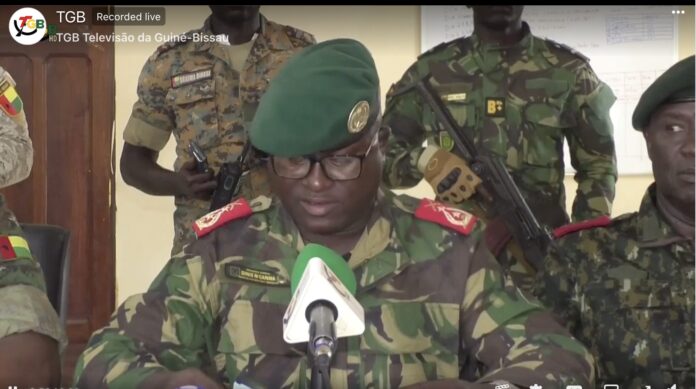Soldiers in Guinea-Bissau have taken control of the country, arresting President Umaro Sissoco Embaló and suspending the electoral process, officials announced on Wednesday. The dramatic move comes just three days after a fraught national election, plunging the small West African state into uncertainty once again.
On Wednesday around midday, residents of the capital, Bissau, were jolted by gunfire near the presidential palace and the headquarters of the electoral commission. In the chaos, men in military uniform sealed off major routes and sealed off government buildings.
Later, uniformed officers appeared on state television. A senior military spokesman, Denis N’Canha, announced that the armed forces had “taken total control” of the country.
According to their announcement, the newly formed body, the High Military Command for the Restoration of Order, would run the country “until further notice.” The military also ordered the suspension of all state institutions, shut down borders, and called for calm among citizens.
President Embaló confirmed that he was arrested around 1:00 p.m. while at his office. He described the event as a “coup d’état” led by the army’s top brass.
The takeover comes on the heels of national elections held on November 23. Both presidential and legislative votes took place — and both major presidential contenders claimed victory. Embaló, seeking a second term, asserted that he had won, while his main rival, Fernando Dias da Costa, also declared himself the winner. Official results, however, were only expected the following day.
Tensions were already high even before the elections. Critics accused Embaló of weakening democratic institutions. Just a month earlier, in late October, the military arrested several senior officers over an alleged coup plot. That crackdown was seen by many as a sign of trouble ahead.
These repeated crises reflect a long-standing pattern of instability in Guinea-Bissau, a nation that has endured multiple coups and attempted coups since its independence from Portugal in 1974.
As the military announced its takeover, the country’s borders — by land, air, and sea — were shut indefinitely. Media outlets were ordered to stop broadcasting, and an overnight curfew was imposed, though the duration remains unspecified.
The electoral process has been suspended. The military junta declared that previous institutions — including the electoral commission and possibly parliament — are now suspended. Calls for calm were aired on state radio and television.
Citizens and observers remain uncertain about what will happen next. With the president detained and key government functions halted, there is growing concern about how long this military rule will last and whether democracy can survive yet another interruption.
Guinea-Bissau is no stranger to coups. Since gaining independence in 1974, the country has repeatedly slipped into military rule. The decades-long pattern has disrupted development and deepened political fragility.
Under Embaló’s rule — which began in 2020 — the political atmosphere had often been tense. Opposition parties accused him of suppressing dissent and undermining democratic institutions. The arrest of senior army officers shortly before the 2025 elections had already raised alarm bells.
Now, with the military takeover, many fear that Guinea-Bissau may slip deep into a prolonged period of uncertainty — with implications for governance, human rights, and the country’s fragile economy.
This coup is likely to draw strong reactions from regional bodies and international partners who have in the past attempted to stabilise politics in Guinea-Bissau. The intervention by the military underlines persistent weaknesses in democratic institutions in some West African nations.
For ordinary citizens, the immediate concerns are practical: will the borders remain closed, how long will curfew last, and when — if at all — will elections resume?
Economic hardship may deepen, as government services and foreign trade grind to a halt. Many will worry about growing insecurity and the risk of further political violence.
Finally, this event marks yet another setback for democracy in the region — potentially emboldening military forces elsewhere to intervene when elections produce unclear or contested results.

